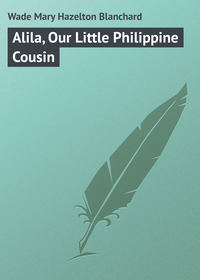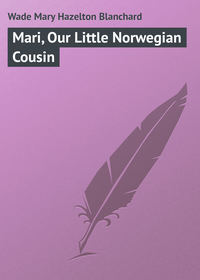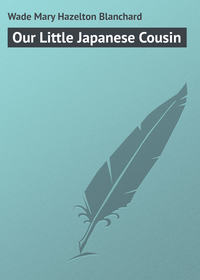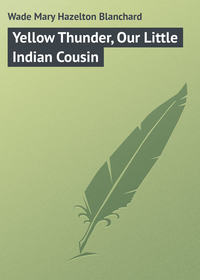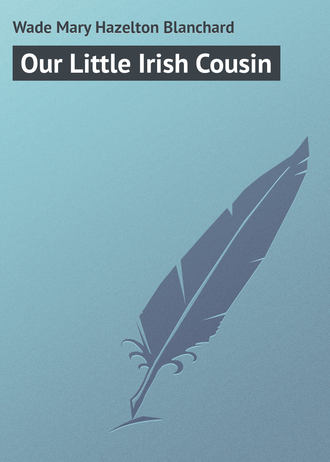 полная версия
полная версияOur Little Irish Cousin
Stop for a minute and think of the thousands of little children who lived almost entirely on potatoes up to this time. Some of them, it is true, had bread every day, and meat once or twice a week.
But there were many many homes where the only food of the family was potatoes. Then you can picture what happened when there were no more potatoes.
The smiles soon gave place to tears. The roses faded away from the cheeks. The bright eyes grew dull and heavy.
Poor little children of Ireland! Think what became of them when the last piece of furniture had been sold to buy bread!
Alas! many of them were soon without even shelter. For they were driven with their parents out of their small homes, because there was no possible way of paying the rent.
Then what? Fever and sickness travelled from place to place. Death followed in their pathway. There were many days of cruel suffering before the rest of the world waked up and sent help to the sick and the starving in Ireland.
America showed herself a kind friend in that sad time. It was some of the very food she sent to Ireland that saved the life of Norah's grandmother. She and her brothers were nearly starving when the help came. They lived on the seashore and had been trying to keep themselves alive by eating seaweed and moss. Those were dreadful times, indeed.
Mrs. O'Neil stopped to pat Norah's head, which was in her apron. The child was crying softly.
"There, there, those hard days are over now, my child," said her mother, tenderly. "The sky is brighter for Ireland than it has been these many years. You must not let this fine lady see you cry. Enough water has fallen outside to-day without our adding to the shower."
Norah began to laugh, while she wiped away the tears with her mother's apron.
The visitors once more rose to go. At the same time one of the gentlemen stepped to Mrs. O'Neil's side and said in a low tone, "We would not think of offering pay for your kindness to us this afternoon, but it will give me a great deal of pleasure if you will take this and buy a little kid with it for Norah."
He pressed some money into the good woman's hands.
"But we have one goat now, as you must have seen," she said.
"Two goats will give the children twice as much milk as one," he answered, with a laugh. "And, besides, I want Norah to have the new goat for her very own."
Mrs. O'Neil could not refuse such a kind offer. "Thank ye entirely, and may Hiven send its blessing on ye all."
By this time the driver had brought the horse and the jaunting-car from the little shed, and the party drove off in the direction of Killarney.
CHAPTER III
ST. PATRICK
"SURE and it's Father Tom himself," said Norah's mother. She was in the midst of the family washing. Katie was rocking baby Patsy, and Norah was brushing up the rough mud floor. Every one stopped work at once and ran out of the cabin, the mother wiping her hands on her apron, and Norah lifting Patsy and carrying him along in her strong young arms.
The whole village had by this time turned out into the lane and gathered around the kind fat priest, who had a smile for each and all.
There were old people hobbling along with the help of sticks, men who had stopped work for the sake of a blessing from the priest, mothers with babies in their arms, and children big and little.
It was a glad day when Father Tom came to the village to see how all were getting along. There were so few people that the village had no church of its own. They went four miles every Sunday to the nearest service. Almost every one had to walk, for there were only two or three donkeys and one or two rough carts in the whole place. A visit from the priest was a great honour, a very great honour. The children knelt in his pathway that he might lay his hands on them and bless them. The men took off their hats and bowed their heads low as he passed by. The old women made as good curtsys as their stiff backs would let them.
Norah put little Patsy down on the ground, whispering, "Patsy, dear, touch the good man's robe with your little hands. It will make ye a better boy."
Father Tom must have heard the whisper. He turned around and placed his hands on the baby's curly head. Then he made a short prayer and blessed him.
"I will take a sup of tea with you, Mrs. O'Neil," he said to Norah's mother. "I am quite tired, for I have walked all the way from my home this morning."
Mrs. O'Neil was much pleased. She hurried home, while the priest and children followed her more slowly.
As she hung the kettle over the fire and set the table for the priest's lunch, he gathered the children around him and told them stories of St. Patrick, the dearest of all saints to the Irish people.
It was a long, long time ago that the King of Ireland was holding a festival in the Hall of Tara.
"Put out all the fires," he had commanded his people. "Let no light be seen till a blaze bursts forth from the hill of Tara."
Not one of his subjects would have dared to disobey the king's command.
You may judge, therefore, how surprised he was when he looked out into the darkness and saw a light. It grew stronger and stronger every moment. A great fire was blazing near by on the top of a hill!
Who could have dared to disobey the king? What was the meaning of the fire? The Druid priest for whom the king sent in haste said:
"O king, if that fire is not put out to-night, it will never die in this country."
Now it happened that the festival which the king and his people were celebrating was held on the night before Easter Sunday. Few people of Erin had at that time heard of Easter Sunday. They knew nothing of the life of the Christ Child. They were Druids, and had a strange belief of their own.
Their chief priests dwelt in the dark forests of oak-trees, and taught their followers to worship fire as the symbol of the sun.
But a new teacher had come into their country. He had a message to the people. He wished to tell them of the Christian religion and of Jesus, who had lived and suffered and died to help all mankind.
The name of the new teacher was Patrick, and Scotland was his early home. When he was sixteen years old, he was surprised by a band of robbers. They made him their prisoner and took him with them to Ireland.
After he had been with them six months, he managed to get free and went back to Scotland.
But he was carried off a second time, and again he escaped. After he reached his own home once more, he said to himself, "I should like to help the people of Ireland. I should like to tell them of Jesus and his religion."
He began to study and prepare himself for teaching. At last he was made a bishop.
After many years, he was able to go back to Ireland. It was what he had long wished to do.
It was the eve of Easter Sunday when he lighted that great fire on the hilltop and surprised the king by his daring.
"I will send for the man who kindled that fire. Let him come before me at once," commanded the king.
Patrick was brought in haste, but he was not frightened in the least.
When the king and the princes, the nobles and the Druid priests were gathered together, he told them he had come to Erin to put out the fires of the Druids. He wished to stop the making of the pagan sacrifices in which the people then believed. He had brought something better in their place. It was the Christian religion.
What do you suppose the king replied?
He was very angry, of course. But still he asked Patrick to meet the wise men of the country the next day and talk the matter over. Then he could explain his belief to them.
On the next day he did meet them. He talked so well and so wisely that many of the listeners thought he knew a great deal more than they did. They became Christians then and there.
The king then gave Patrick the right to preach all over Ireland. As he went from place to place, he spoke so well that all those who listened to him felt his great power.
In a short time the whole of the people became Christians, and the strange worship of the Druids came to an end.
Father Tom told Norah and her sister many wonderful stories of the life of St. Patrick. He told of a spring of water he had visited. This spring worked miracles.
It happened that St. Patrick and St. Bridget were one day taking a walk. She said she was thirsty. St. Patrick struck the ground with his staff. Water instantly began to bubble up through the earth, and a spring has been there ever since.
Father Tom went on to tell of strange wriggling things called snakes. He had seen them in other countries. They were something like big worms, and were of different colours. The bite of some of them was poisonous.
"But we have none of them in our own beautiful Ireland," he said. "You may thank the blessed St. Patrick for sending them out of this country."
Norah and Katie both shivered when they thought of the snakes. How good St. Patrick was to drive the horrid creatures out of Ireland!
"There is a grand church in the city of Dublin called St. Patrick's Cathedral. When you grow up, Norah, you must surely visit it," said the kind priest, as he finished his story-telling. "It stands on the very spot where St. Patrick himself once built a church. It is a fine building, and its spire reaches higher up toward heaven than anything you have ever seen made by men.
"But, my dear little children, your mother has prepared me a nice luncheon. I must eat it, and then visit poor Widow McGee, who is very ill."
A half-hour afterward, Father Tom had left the little home, and Mrs. O'Neil was once more hard at work over her wash-tub. Norah was out in the yard amusing baby Patsy.
"Mother, mother," she called, "Mrs. Maloney is on her way here. She has just stopped at Mrs. Flynn's."
"Come in and get some petaties ready for her, Norah. I don't want to stop again in my work." (Mrs. O'Neil pronounced it "wurruk.")
Mrs. Maloney lived in a lonely cabin about two miles away. You would hardly believe it, but Norah's home was almost a palace beside Mrs. Maloney's.
There was one little window, as she would have called it. It was really only a hole in the wall. When heavy rains fell, the old woman stuffed it with marsh-grass. The thatched roof had fallen in at one end of the cabin. The furniture was a chair and a rough bedstead.
Poor old Mrs. Maloney! Once she had a strong husband and eight happy children, but, one by one, they had died, and now she was old and feeble, and had no one in the world to look after her.
Is it any wonder that the generous people whom she visited always had something to give and a kind word to speak to her?
Every few days, she went from house to house, holding out her apron as she stood in the doorway. She did not need to say a word. One kind woman would give her a bit of tea, another a loaf of bread, a third a cabbage, and a fourth a little butter.
In this way she was kept from starving, or from going to the workhouse, which she dreaded nearly as much.
As Norah dropped the potatoes into her apron, the old woman blessed her heartily. As she turned to leave, Mrs. O'Neil called after her to ask how she got along in yesterday's bad storm.
"Sure and I was that feared I dared not stay in the cabin. It was so bad I thought it would fall down on me shoulders. So I wint out and sat on the turf behind it. I was wet indade when the storm was over."
"Too bad, too bad," said Mrs. O'Neil, in a voice of pity. "We must see what can be done for you."
She did not forget. That very night she asked her husband if he could not find time to mend the old woman's hut and make it safe to live in. He promised her that as soon as the potatoes were hoed he would get his friend Mickey Flynn to help him and they would fix it all right.
"Ah! Tim, Tim," said his wife, with her eyes full of tears, "of all the eight children Mrs. Maloney has lost, there is none she grieves over like her boy John, that went to Ameriky and was never heard of again.
"Maybe he lost his life on the way there. Maybe he died all alone in that far-away land, with no kind friends near him. No one but God knows."
Mrs. O'Neil crossed herself as she went on, "Think of our own dear girl in Ameriky, and what might happen to her!"
CHAPTER IV
DANIEL O'CONNELL
"O Paddy, dear, and did you hearThe news that's going round?The shamrock is forbid by lawTo grow on Irish ground."NORAH was sitting by her father's side as the family were gathered around the fireplace one chilly evening. She was singing that song they loved so well, "The Wearing of the Green."
"I picked some shamrock leaves this morning, and I put them in the big book to press. Can they go in the next letter to Maggie, mother?" asked the little girl, as she finished singing.
She jumped down from her seat and went to a shelf, from which she took the treasure of the family. It was the only book they owned besides their prayer-books.
It told the story of a man loved by every child of Erin, – the story of Daniel O'Connell.
Opening the leaves carefully, Norah took out a spray of tiny leaves. They looked very much like the white clover which is so common in the fields of America. It was a cluster of shamrock leaves, the emblem of Ireland.
"Yes, it shall go to Maggie without fail," said Norah's mother. "It will make her heart glad to see it. The fields behind our cabin will come to her mind, and the goat she loved so well, feeding there. Oh, but she has niver seen Patsy yet!"
"Father, please tell us the story of that great man," said Norah. "I am never tired of hearing it."
Norah pointed to the big book as she spoke. The first money Maggie had sent from America had bought it, so it was doubly precious to every one in the little home.
Daniel O'Connell! What a friend he had been to Ireland! The face of Norah's father grew brighter as he began to tell the story of the brave man who had worked so hard to help his people. But the story-teller first went back in the history of Ireland to a time long before the birth of O'Connell.
The Irish had at last been conquered by England. They had fought against her for four hundred years. It was hard now to have English rulers in the country and to have English lords take their lands away from them.
It was harder still to have these rulers say, "You must worship as we worship. If you remain Catholics, we will punish you."
The hard-hearted Cromwell came to Ireland, bringing a large supply of Bibles, scythes, and firearms. The Bibles were for those who were willing to become Protestants. The firearms were used for killing those who would not give up their religion. The scythes cut down the crops of those who did not happen to get killed and yet held to their faith.
"They shall be starved into obeying my orders," said the stern Cromwell.
As though this were not enough, forty thousand of the Irish people were driven to the seacoast. They were put on board ships and sent to Spain. Never more should they see the Emerald Isle they loved so well.
Weeping and moaning could be heard all through Ireland. But a still more pitiful sight followed. It was a procession of children who had been taken from their homes. They, too, were driven on board ships which were waiting for them. These poor helpless boys and girls were to become slaves on the tobacco plantations of the West Indies.
How their mothers' hearts must have ached! What sobs and groans must have filled many a lonely cottage of Ireland!
One hundred and fifty years passed by. They were hard years, and full of trouble.
Then the people began to whisper to each other, "A real helper has come at last."
It was the young Irishman, Daniel O'Connell, who lived the life of a country boy in a quiet place in Kerry. It was scarcely twenty-five miles from Norah's home.
An old schoolmaster taught Daniel his letters in a little village school. No one noticed the brightness of the boy's mind until long afterward, when he was sent to a college in France. After he had been there a year, the principal began to see he was not like most boys.
"He will be a great man, unless I am much mistaken," he thought. He was not disappointed.
Daniel studied hard and became a lawyer. His chief thought was always, "Ireland! Poor Ireland! How can I help my country?"
He worked early and late. He studied far into the night. He would have little chance as a lawyer unless he became very wise, and was keen and quick in his wits.
For he was a Catholic. That was much against him. The judges in the courts were Protestants and were ready to favour Protestant lawyers.
But O'Connell's heart was full of courage. He did not lose hope for a single moment.
When he began to practise law, he showed every one what a bright mind he had. He was quick to see little mistakes and point them out.
He stayed in the court-room during the whole of a trial. He would not leave it for a minute, even if he had been there many hours. He had lunch brought in to him. He was afraid if he left the court that something might be said he ought to hear.
"He is very bright." "He sees every blunder." "He is a sharp-witted fellow." People began to say things like these. Or, perhaps, some bold Irishman would tell his friend, "England can't have it all her own way much longer. Dan O'Connell will see to that."
Now, while this clever young lawyer was busy in the courts in the daytime, he was doing just as important work in the night.
Evening after evening he met with the friends of Ireland. He talked with them of the best way to help their country.
"But no blood must be shed," he would say again and again. "No blood must be shed. That would be too high a price to pay. Besides, it has been fully tried for hundreds of years, and nothing but bitterness and misery has come of it. And yet the Catholics must have equal rights with the Protestants."
He saw only one way of bringing this about. It was by getting all the people to vote alike. Then the English rulers would see how strong and how much in earnest the Irish people were.
There were years of hard work before Daniel O'Connell was able to bring about any change. At last, however, the government of England was obliged to pass a law giving Catholics the right to vote and hold office the same as Protestants.
It is said that when the king signed the law he was so angry he broke the pen with which it was done, and stamped upon it. But he knew he had to do it, and there was no way out of it.
Daniel O'Connell had won. He was the great Liberator of his religion in Great Britain.
He now tried to gain a separate government for Ireland. But he did not live to finish his work. He was seized with illness. This very time was the beginning of the dreadful famine.
O'Connell could not keep his mind from thinking of the sufferings of his people, and so, of course, he gained no strength. His doctors gave up hope.
The great lawyer and Liberator had but one wish now. He would like to die in Rome under the blessing of the Pope. He did not live long enough to reach the religious capital of the Catholic world, but his heart was preserved and sent there, by his own wish.
His body was sent to Ireland, where there was a grand funeral.
A great monument stands to-day in the city of Dublin. It was built in honour of Ireland's brave helper and true lover, Daniel O'Connell.
It is shaped like the round towers still standing here and there throughout Ireland. They are so old that no one knows when or why they were built. They stand tall and straight and strong and silent. But it seems as though they would say, "Look at us and think of the grand old days of Erin!"
Some people think they were watch-towers from which the enemy could be discovered far away.
When the people wished to build a monument to Daniel O'Connell, they thought nothing would be more proper than a copy of the old watch-towers still standing in the country and reminding every one of the old glories of Ireland.
As Norah's father finished the story, the little girl got up softly and went to a drawer, from which she drew a picture. It was that of a white hound, the dog Daniel O'Connell loved so much.
"Father," she said, putting her arms around his neck, "if you ever see a white hound at the fair in Killarney, please buy it for your little Norah. I will love it tenderly for the sake of that great man."
CHAPTER V
KILLARNEY
"MOTHER, mother! Mollie says can I go with her for a day at Killarney?" cried Norah, rushing into the house quite out of breath.
And, indeed, it was no wonder. She had run every step from her friend Mollie's, which was a good half-mile away.
Mollie's father seemed quite rich in Norah's eyes. He had a farm, where he kept three cows and twenty sheep. Yes, and a horse besides. Not a donkey, mind you. Two of Norah's neighbours owned donkeys, but Mollie's father was so well off that he had a real live horse, and a jaunting-car of his very own.
When the work was not heavy, the farmer sometimes took his family for a day's pleasure.
"If it is fine weather to-morrow," he promised Mollie, "you shall ask Norah to go with us. It will be a rale treat for her."
How Norah's eyes sparkled as she told her mother of the invitation! Her cheeks were more rosy than ever, and as she laughed over the good news, her teeth looked for all the world like the loveliest of pearls.
The next morning she was out-of-doors at sunrise, to see what signs there were of good weather. Dame Nature was very kind to the little girl, and made the sun spread his loveliest colours over the eastern sky.
There was a great scrubbing and cleaning before Norah was ready to start. Her mother combed and brushed her thick, long hair, and made it into two glossy braids. What did it matter if there was no hat to wear! She was so pretty, she did not need straw or ribbon to make people stop to look at the bright, happy face, with eyes ever ready to laugh or cry.
When she was dressed in her pink cotton gown (it was the only one she had, and her mother had washed and ironed and mended it the night before, after Norah had gone to bed), she ate her breakfast, and slipped over the fields to Mollie's, as happy as a lark.
The horse and car already stood waiting at the door. Mollie and Norah, and Mollie's sister Bridget, sat together on one side of the car, while the jolly farmer, with his wife and baby, filled the other seat. Mollie's big brother Tim was the driver.
As they jogged along through the beautiful country, the party sang "Killarney" and other favourite songs. After awhile, Mollie's mother started "The harp that once thro' Tara's halls," and every one joined in with a will.
When the song came to an end, the farmer told the children about an old harper who used to go wandering through the country. He stopped at every place to play the tunes the people loved so well.
But that was before Mollie and Norah were born. Yes, before even the farmer himself was born. He had heard his mother tell about the old man, and how bright his eyes grew as his fingers drew out the tunes from the harp.
Once upon a time there were many such harpers in the country. Those were the days of the Irish kings and lords. There were feasts and dancing and music in many a stone castle in those times.
But now, alas, most of the castles are only ruins, where the kindly ivy covers the piles of stones, and the wind howls through the empty door and window places.
One castle was the grandest of all. It was called the Hall of Tara, and was built on the top of a high hill. Mollie and Norah had often heard of the doings in that grand building.
It was the place where the Irish princes met together to choose their king. It was there that he was crowned, upon an upright stone that actually roared during the ceremony. At least, so the story runs.
The laws of the country were made in the Hall of Tara, and a great feast was served there before commencing business each day. Three loud blasts were sounded by the trumpeter to call the people together in the great dining-room.
Not only princes and nobles met in Tara's Hall. There were also poets and wise men. For those were the days when Ireland had places of learning where many scholars gathered, to study history and poetry, the movements of the sun and stars, and many other things. Those were great days for Old Ireland.


